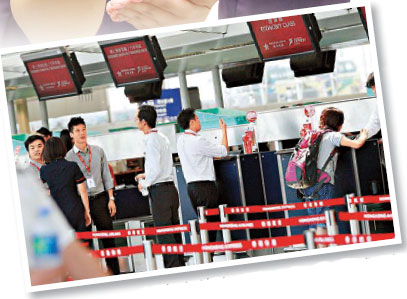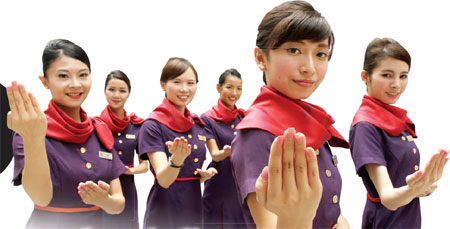Putting the chill on high-flying hotheads
By SL Luo ( HK Edition )
Updated: 2013-09-13
Asia's overcrowded skies, grinding flight delays, exploding air travel and lax laws are creating toxic brew, contributing to a ferment aboard passenger aircraft, that's moved one Hong Kong airline to train its cabin crews in unarmed combat to deal with unruly passengers. SL Luo writes.
A German passenger right in front of me flew into a rage on a flight from Hong Kong to Frankfurt, way back in 1995. He flung his beer in the face of the poor flight attendant, then demanded that she apologize. The inexperienced flight attendant had failed to observe the proper protocol when pouring beer and instead of pouring it down the side of his glass, just dumped it, causing a thick layer of foam, or "head", to form.
It was the only case of air rage I've seen but statistics clearly show air rage is unleashed and stalking the air corridors. It's on the ascent in this part of the world amid a boom in air travel in Asia, fueled by the burgeoning class of experiencing hungry nouveau riche, held aloft by an inflated economy and ignited by competitive air fares just too good to pass up.
Reports of unruliness by passengers on board mainland carriers are not new. What aggravates the problem these days is the frustration caused by regular flight delays, springing up like dragons' teeth from seemingly innumerable causes like overcrowded skies, tight airspace controls, unfavorable weather conditions and weak management.
'Most held-up airports'
Beijing and Shanghai airports already have been branded as the "most held up airports in the world".
A CCTV camera caught a man in Yunnan province venting his anger over a missed flight, demolishing an airline counter. He said it wasn't his fault that he missed the flight. He was going to miss a few more flights after that incident though, while spending six months behind bars.
There's been a string of incidents seeing passengers forming angry packs, assaulting airline employees, lashing out because their flights were delayed. It's happened at several mainland airports.
The injustice of it all is the flight crews are as guiltless as the passengers in causing the delays. There was a photo that spread on the Internet not long ago. The flight attendants of a southern China airline had fashioned a shrine to being an "On Time" shrine aboard their aircraft and were pictured kneeling before it, likely in hope of divine intervention.
In days of yore, just the sight of another person getting on an airliner was taken to be almost a privilege. Most people could never even dream they'd ever ride an airplane. Today, there's a feeling among the public at large that the modern jet set are too expectant of being served hand and foot and too pent up and ready to lose control if things don't go their way.
Air rage has not yet risen to such a height that tough laws are needed to maintain airline safety. Nonetheless, the emerging carrier, Hong Kong Airlines, has been tweaked enough to start training cabin crews in the martial art of Wing Chun - a branch of kung fu popularized by the late Bruce Lee: rapid, powerful, short-range punches capable of being delivered in the confined space of an aircraft cabin, enough to cause an unruly passenger to wish he'd kept his feet on the ground.
The airline (formerly Hainan Airlines) had reported about three incidents of misbehaving passengers every week last year and had no qualms about introducing the steel hand in the velvet glove. The airline, however, denies the training is meant to subdue passengers who get ugly.
The official explanation from the airline's website reads: "Wing Chun kung fu training is aimed at cultivating strong minds among the staff, improving their body quality and providing the best overall services to passengers under any circumstances during flight." Nonetheless, it goes without saying that all that and a sharp blow to the solar plexus will get you a more compliant passenger.

A cabin crew orientation for the king fu course started in May 2011. Every new member of the cabin crew was asked to attend a half-day elementary training class to learn the basics skill of Wing Chun.
To back up its argument that the course is not specifically aimed at tackling air rage, Hong Kong Airlines says it may also introduce cycling and gymnastics as optional training for its cabin crew members.
Jamie Chung, who has been a flight attendant with the airline for a year, told China Daily that learning Wing Chun helps cultivate the "right set of mind" for crews to handle any emergency calmly.
High-spirited, healthy
"I feel very high spirited and healthy after having taking the course. It also makes us healthier and better equipped to take the right approach while satisfying our passengers' requests," she says.
Chung claims she's never been the target of untoward behavior by passengers during a flight. "Of course, we wouldn't use Wing Chun to deal with them even under difficult situations."
What would she do if she were physically mishandled or attacked in flight? "We' don't retaliate physically, but seek help from senior staff. The decision would be up to the senior staff," Chung says.
Hong Kong Airlines says it has no plans to blacklist or bar passenger based on a history of bad behavior. But if passengers become violent during a flight, the captain of the aircraft will see that the police are waiting when the plane lands at its next destination.
Hong Kong flag-carrier, Cathay Pacific, and its wholly-owned airline, Dragonair, declare they have a "zero tolerance" policy toward unruly behavior aboard.
One veteran jet-setter, speaking from the passengers' perspective, say the reasons for a passenger taking the law into his own hands can be many - frustration over service, built-up animosities toward the airline, general unhappiness, personal problems or sheer orneriness.
Another major drawback is that Hong Kong's aviation laws governing unruly behavior among air passengers have no deterrent effect. The laws are lax.
Some even worry that sharp reactions by local authorities may touch off declines in passenger and cargo tallies at Hong Kong International Airport (HKIA). In April this year, HKIA recorded across-the-board increases in traffic volume, with passenger trips and flight movement seeing year-on-year growth of 1.1 percent and 5.1 percent to 4.9 million and 30,530, respectively.
According to the veteran air traveler, the city, nonetheless, takes comfort that its strong technological base and professional management skills have distinguished Hong Kong as a regional air hub.
"Despite Hong Kong's status as a regional air travel center, there's no likelihood of air rage ballooning into a pressing problem for us. It hasn't reached boiling point yet," he smiles.
Contact the writer at theam@chinadailyhk.com
|
Growing incidents of air rage have forced airlines to step up security at airports. |
|
Parker Zheng / China Daily |






